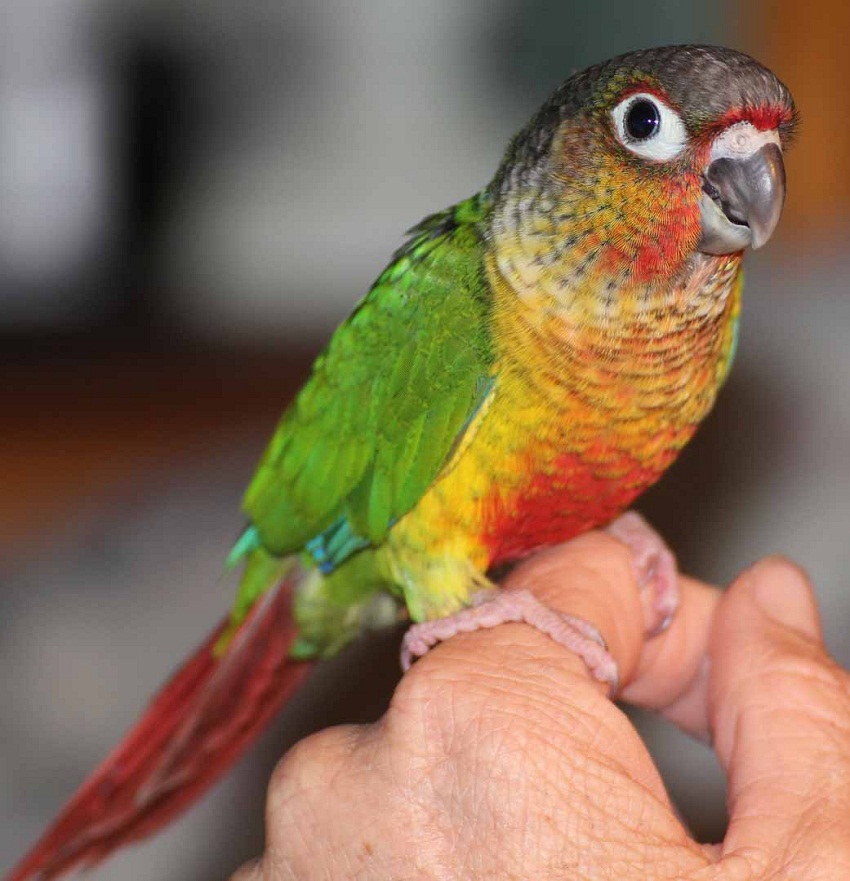|
| Wizard Administrator
Member since: Oct 23, 2012
Threads: 239
Posts: 6095 | My son has been asking to get a parrot for months. He brings it up every day. In college I worked for a guy who bred exotic parrots. His personal favorite was the African Grey, but I'm not sure I want to get such a large bird that may outlive me. The small ones like parakeets I don't find much fun. I'm thinking of a medium-sized parrot. Something that is fun and will sit on your finger and go back in its cage without a lot of drama. A bird that talks would be fun, but not a requirement. I'm thinking of something about the size of a green cheek conure, but am open all ideas at this point. Thanks in advance for any advice. The question for the poll is what would you get in my shoes?  Green Cheek Conure Knowledge is Good -- Emil Faber |
|
| AZDuffman Member since: Oct 24, 2012
Threads: 135
Posts: 18209 | |
|
| rxwine Member since: Oct 24, 2012
Threads: 189
Posts: 18762 | Quote: Parrot psychology[edit]
Although very trainable and intelligent, parrots are a prey species and are naturally more cautious than predatory species such as dogs. They often must be trained more slowly and carefully. Parrots can, however, eventually be taught many complicated tricks and behaviors, and remember them for years. Parrots are often used in shows at zoos and amusement parks.
Parrots need to socialize. Some behavior problems may be averted through parrot training. As with any animal, training birds also requires patience, time, and commitment for up to several minutes a couple times a day.
Taming[edit]
Parrot taming, or teaching, can be measured by the number, or types of behaviors it knows. Teaching can be achieved through the science behind operant or classical conditioning and is what is currently accepted by the major AZA accredited zoos and aquariums in the US. If a parrot is exposed to an unusual or mildly aversive stimulus on purpose, such as a new toy or a hand it can create a fear response very easily in a prey animal such as a bird. Training is at a comfortable pace so the bird accepts the object via small approximations in behavior. Teaching any animal this way prevents flooding and initiation of its fight or flight response.[1]
Common tricks[edit]
Tricks commonly taught to pet parrots may include targeting,[2] approaching on command, retrieve,[3] shaking "claws", opening wings, bowing, riding bicycles, flying through hoops, flying free outdoors, talking and singing on command, and roller skating.
Flight tricks[edit]
A wide assortment of tricks can be taught which incorporate flight. Recall flight, targeted flight, and the flighted retrieve trick, where the parrot flies to retrieve an object and bring it back. A parrot can fly to retrieve a coin and fly to a different location to drop it in a piggy bank or it can fly to pick up a ball and fly up to a basketball hoop and drop it in.
Flight training a bird to be a reliable flyer requires expertise on the trainer's part. If the trainer is not dedicated to both positive reinforcement and negative punishment training, then problems will occur in the training.[4] Birds may learn to fly away from the owner or new objects as a result of flooding.[1] Trainers who do not rely exclusively on positive reinforcement and negative reinforcement training will often use harnesses on their birds because of the poor training techniques they apply[5] such as; grabbing the bird when it does not want to train, snatching the bird out of flight, launching the bird off the hand, and dropping the hand to make a bird fly, all of which increase the fear response in a bird. Harnesses can be a great tool when used properly as a rarely used backup plan to keep the bird safe. But if the trainer heavily relies on a harness to keep the bird safe, then it is an obvious sign that the training methods used where not positive reinforcement and negative punishment. Trainers who use the harness too much often have problems controlling the bird in an outdoor environment and have problems with birds flying off and not coming back. This problem can be remedied by refining the person's training skills and by eliminating negative reinforcement and positive punishment from the training routine.[1]
You believe in an invisible god, and dismiss people who say they are trans? Really? |
|
| Evenbob Member since: Oct 24, 2012
Threads: 146
Posts: 25011 | Parrots are messy, loud, fussy, demanding and they can live a very long time. If you get a parrot at 15, you could have the same bird at 70. Do you really want a lifetime commitment of a loud, messy, demanding bird? If you take a risk, you may lose. If you never take a risk, you will always lose. |
|
| RonC Member since: Nov 7, 2012
Threads: 8
Posts: 2505 | Quote: Evenbob Parrots are messy, loud, fussy, demanding
and they can live a very long time. If you
get a parrot at 15, you could have the
same bird at 70. Do you really want a
lifetime commitment of a loud, messy,
demanding bird?
That's what I like about EB...he points out the negative in everything! He still hasn't sent me is roulette strategy, though...I have been asking for years. |
|
| rxwine Member since: Oct 24, 2012
Threads: 189
Posts: 18762 | Just think Wizard, you can ride your unicycle with a parrot on your shoulder. Or it can do some commentary during ask the Wizard. You believe in an invisible god, and dismiss people who say they are trans? Really? |



